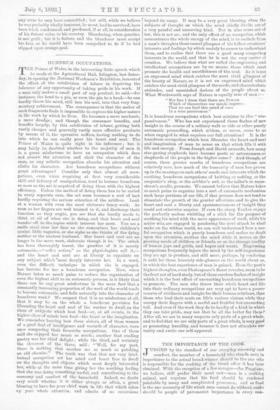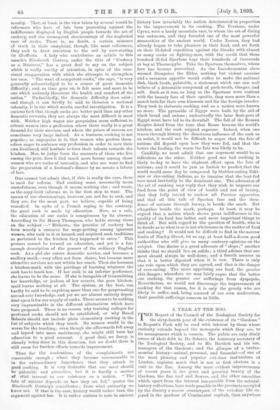THE IMPORTANCE OF THE COOS.
JUDGED by the standard of our everyday necessity and comfort, the member of a household who stands next in importance to the actual bread-winner should be the one who is responsible for the cooking of the bread after it has been obtained. With the exception of a few savages—the Fuegians, we believe, still prefer their meat raw—man is a cooking animal, and requires that his food should be rendered palatable by many and complicated processes; and as food is the one necessity of life which man cannot do without, cooks should be people of paramount importance in every com. inanity. That, at least, is the view taken by several would-be reformers who have of late been protesting against the indifference displayed by English people towards the art of cookery, and the consequent shortcomings of the neglected race of cooks. There is, no doubt, a certain measure of truth in their complaint, though, like most reformers, they seek to draw attention to the evil by over-stating its ill-effects. A. lady who contributes an article to this month's Nineteenth Century, under the title of "Cookery as a Business," has a great deal to say on the subject which is really worthy of attention, in spite of the occa- sional exaggeration with which she attempts to strengthen her case. "The want of competent cooks," she says, "is very generally acknowledged to be a source of great domestic difficulty; and, as time goes on, is felt more and more to be one which seriously threatens the health and comfort of the nation." Undoubtedly, the domestic difficulty does exist ; and though it can hardly be said to threaten a national calamity, it is one which merits careful investigation. It is a carious fact that though cooks arc better paid than any other domestic servants, they are always the most difficult to meet with. Neither high wages nor perquisites seem sufficient to attract women into a profession where there really is a great demand for their services, and where the prizes of success are sometimes very large indeed. As a business, cooking is not popular; so unpopular is it, that women who profess them- selves eager to embrace any profession in order to earn their own livelihood, still hesitate to turn their talents towards the kitchen. Nor, to judge from the accounts of those who live among the poor, does it find much more favour among those women who are cooks of necessity, and who are wont to find the preparation of a husband's dinner by no means a labour of love.
One cannot but admit that, if this is really the case, there is need for reform. Bad cooking must necessarily mean wastefulness, even though it means nothing else ; and waste, as the copy-book informs us, is the first step to want. The causes of our shortcomings, however, are not far to seek, and they are, for the most part, we believe, capable of being remedied. In spite of a French saying to the contrary, the good cook is made by education. Now, as a rule, the education of our cooks is conspicuous by its absence. According to Sir Henry Thompson, who holds strong views on the subject :—" Hitherto, the practice of cookery has been merely a resource for wage-getting among ignorant women, who took to it at hazard, and acquired such traditions as pertained to the kitchen they happened to enter." This process cannot be termed an education, and yet is a fair enough description of the genesis of the ordinary English cook. As a girl she enters domestic service, and becomes a aoullery.maid,—very often not from choice, but because more attractive services are not within her reach. Then she becomes a kitchen-maid, with the privilege of learning whatever the cook has to teach her. If her cook is al inferior performer, she learns to be the same. If she is incapable of transmitting her knowledge, or jealous of her secrets, the poor kitchen- maid learns nothing at all. The system, at the best, can hardly be said to be anything more than one for perpetuating second-rate knowledge, and yet we are almost entirely depen- dent upon it for our supply of cooks. There seems to be nothing very impracticable in the different alternatives which have been proposed. There is no reason why training colleges for professed cooks should not be established, or why Board Schools should not include plain elementary cooking in the list of subjects which they teach. No woman would be the worse for the teaching; even though she afterwards fell away and lapsed into mere matrimony, she might still turn her education to a good account. A good deal, we fancy, is already being done in this direction, but no doubt there is still room for further efforts towards improvement.
Thus far the contentions of the complainants are reasonable enough ; where they become unreasonable is in the extraordinary importance that they attach to good cooking. It is very desirable that our meat should be palatable and attractive, but it is hardly a matter of vital interest to our existence as a nation. " The fate of nations depends on how they are fed," quotes the Nineteenth Century's contributor ; from what authority we know not. If that is the case, history would rather turn the argument against her. It is rather curious to note in ancient history how invariably the nation deteriorated in proportion to the improvement in its cooking. The Persians, under Cyrus, were a hardy mountain race, to whom the art of dining was unknown, and they founded one of the most powerful monarchies of the ancient world. Under Xerxes, they had already begun to take pleasure in their food, and set forth on their ill-fated expedition against the Greeks with almost as many cooks as fighting-men, with the result that three hundred ill-fed Spartans kept their hundreds of thousands at bay at Thermopylce. Take the Spartans themselves, whose fare has become proverbial. As the Lacedremonian slave warned Dionysius the Elder, nothing but violent exercise and a ravenous appetite would suffice to make the national dish, black broth, palatable, a statement which one can well believe of a detestable compound of pork-broth, vinegar, and salt. Such as it was, as long as the Spartans were content with the homely fare of their syssitia, they were more than a match both for their own kinsmen and for the foreign invader. They took to elaborate cooking, and as a nation were known no more. The pyramids of Egypt were built by the aid of black bread and onions ; undoubtedly the later flesh-pots of Egypt must have led to its downfall. The fall of the Roman Empire dated from the time that Rome became the world's kitchen, and the cook reigned supreme. Indeed, when one traces through history the disastrous influence of the cook as an artist, it would not be difficult to argue that the fate of nations did depend upon how they were fed, and that the better the feeding, the worse the fate was likely to be.
Candidly, we must admit that one argument would be as ridiculous as the other. Neither good nor bad cooking is likely to-day to have the slightest effect upon the fate of nations; and it would be just as foolish to predict,that the world would some day be conquered by blubber-eating Eski- mos or rice-eating Indians, as to imagine that the best-fed race must inevitably be the dominant one. The advocates of the art of cooking may reply that they wish to improve our food from the point of view of health and not of luxury, that they fully intend to eschew all Persicos apparatus, and that all this talk of Spartan fare and the deca- dence of nations through luxury, is beside the mark. Not altogether beside the mark, perhaps. At least, it may be argued that a nation which shows great indifference to the quality of its food has better and more important things to think of. But with regard to the question of health, who is to decide as to what is or is not wholesome in the matter of food and cooking P It would not be difficult to find in the narrow limits of Harley Street, let us say, at least half-a-dozen good authorities who will give us many contrary opinions on the subject. One doctor is a great advocate of " slops ;" another thinks that we should live on solids ; a third advises that our meat should always be well-done; and a fourth assures us that it is better digested when it is raw. There is only one rule upon which they are agreed, and that is the danger of over-eating. The more appetising our food, the greater this danger; wherefore we may fairly argue that the better our cooking, the greater our sufferings from dyspepsia. Nevertheless, we would not discourage the improvement of cooking for that reason, for it is only the greedy who are likely to suffer, and, being assured of our own moderation, their possible sufferings concern us little.



































 Previous page
Previous page